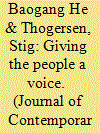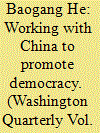| Srl | Item |
| 1 |
ID:
098101


|
|
|
|
|
| Publication |
2010.
|
| Summary/Abstract |
In the last decade Chinese consultative authoritarianism has been renewed through many political and administrative innovations and tools. Authoritarian rule in China is now permeated by a wide variety of consultative and deliberative practices. These practices stabilize and strengthen authoritarian rule, leading to deliberative authoritarianism, an advanced form of consultative authoritarianism. This paper discusses two experiments-deliberative polling at Zeguo, Zhejiang, and a township election in Ya'an, Sichuan. Through these two cases we examine the direction which the development of consultative authoritarianism is presently taking, and the potentials and limitations of such input mechanisms in an authoritarian setting.
|
|
|
|
|
|
|
|
|
|
|
|
|
|
|
|
| 2 |
ID:
110071


|
|
|
|
|
| Publication |
2012.
|
| Summary/Abstract |
In the context of the rise of China, Southeast Asian countries and Australia have begun shifting towards an accommodation policy. Robert Ross examines the accommodation policy in South Korea, Mochizuki discusses Japanese accommodationists, and Manicom and O'Neil show some evidence of Australian accommodation of Chinese strategic preferences. The scholarship has, however, narrowly focused on and overestimated the role of security. Through a study of the origin, process, structural conditions and impacts of accommodation policy, this paper broadens the concept of accommodation to capture its multiple meanings and practices. It finds that a selective accommodation policy and strategy toward the rise of China developed in Australia is a sign of the changing power relations under which the mainstream paradigms of containment and engagement, hard balancing or bandwagoning, have proved inadequate to the task of dealing with China, and that economic interdependence has driven the politics of accommodation in Australia and several Asian countries.
|
|
|
|
|
|
|
|
|
|
|
|
|
|
|
|
| 3 |
ID:
117982


|
|
|
|
|
| Publication |
2013.
|
| Summary/Abstract |
China represents an uncomfortable thorn in U.S. efforts to promote democracy around the world. While some projects have been successful, a large gap exists between the increasing U.S. funding in China and its "limited impact."1 Moreover, U.S. democracy promotion in China has contributed to strategic distrust between China and the United States; Beijing perceives it as a strategic move to destabilize the rise of China and sabotage the Communist Party's leadership.2 At the same time, China's growing power while maintaining one-party rule and rejecting democratic change generates fear and distrust among many Americans.
|
|
|
|
|
|
|
|
|
|
|
|
|
|
|
|